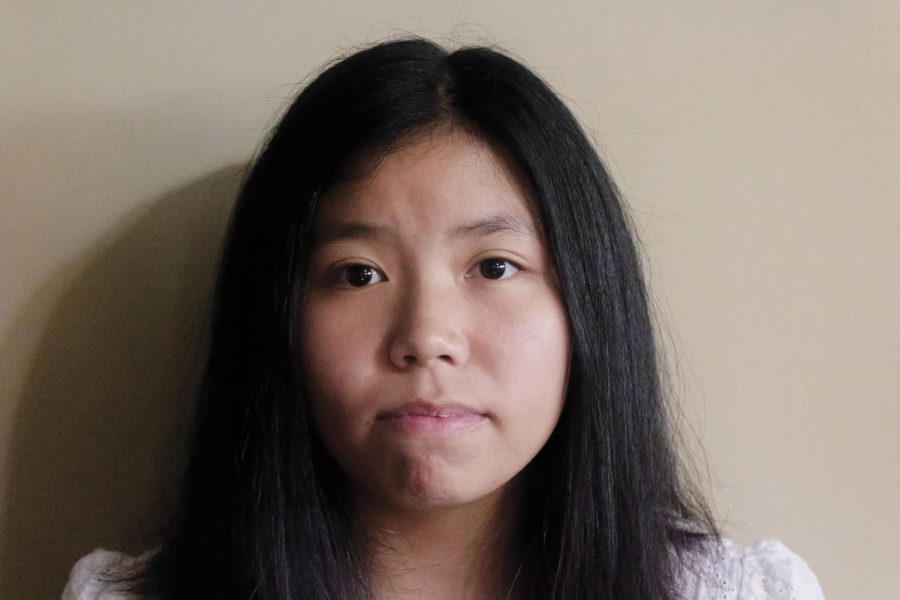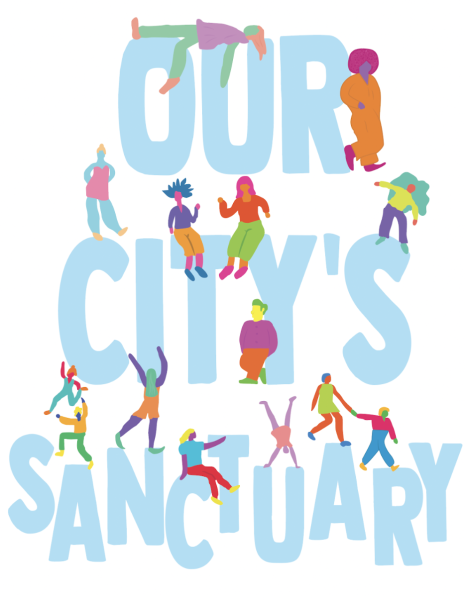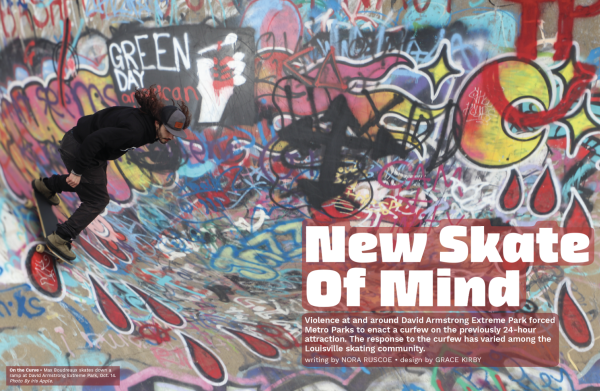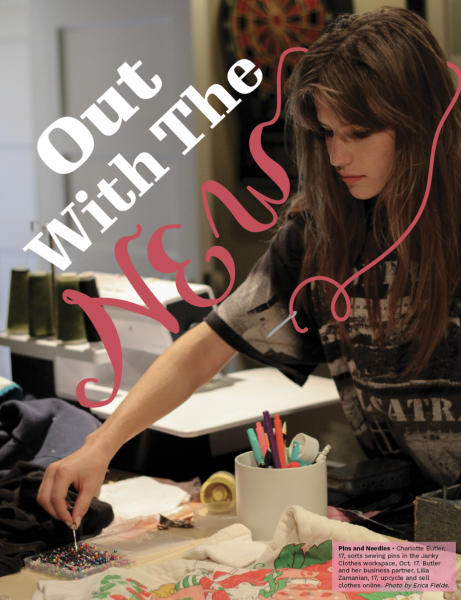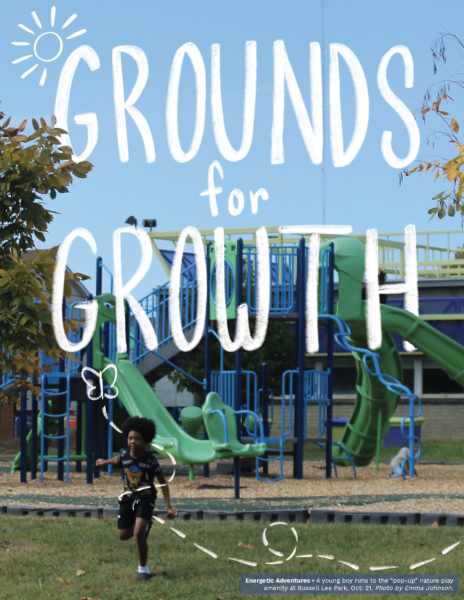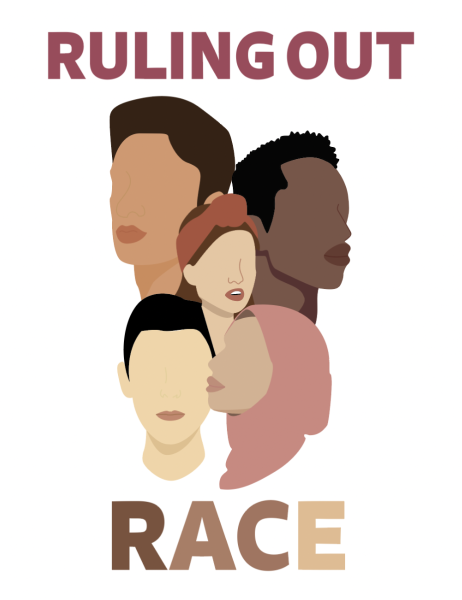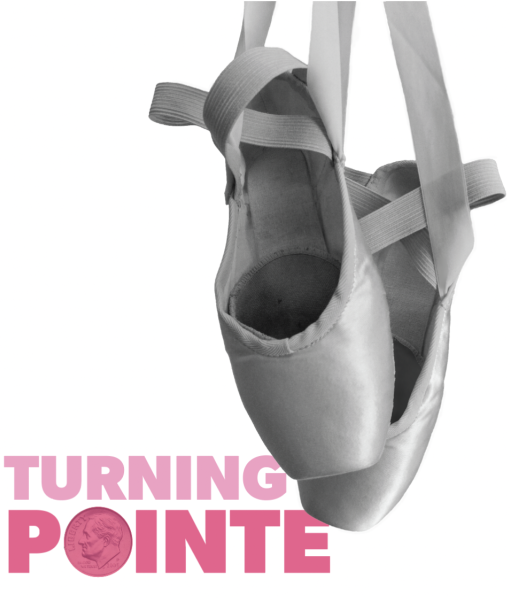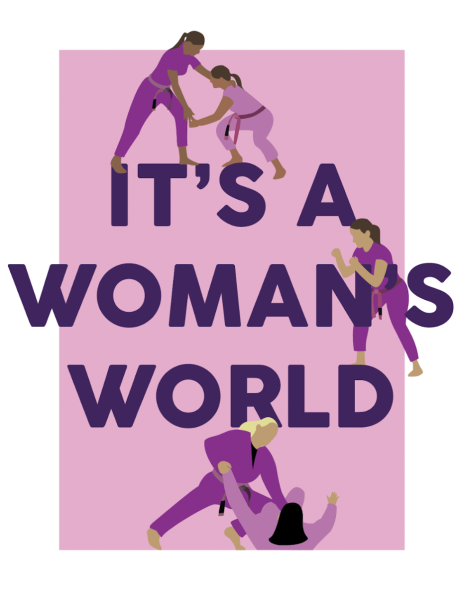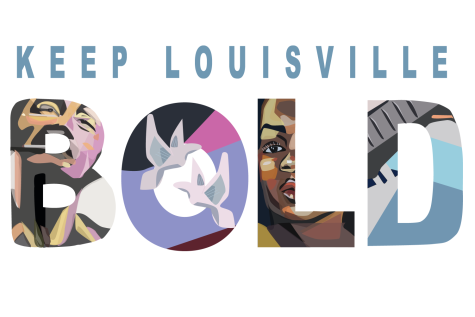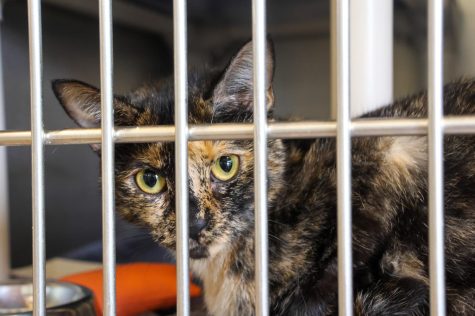fam•i•ly
Whitney was raised by one parent alone. Here, she redefines the word “family.”
Photos by James Jean-Marie
Whitney Nguyen poses for a portrait for her story about her own experiences with child abandonment. Read the print version of the story in any physical copy of On The Record around Louisville.
SENSITIVE CONTENT WARNING: This piece contains content that some may find disturbing.
“Do you ever want to meet your father?”
The spoon nestled within the palm of my hand halted inches before my mouth, the soup wobbling before spilling over the edge onto the table. I stared blankly at the mess before my brain processed the question.
“What?” I asked, still gazing at the puddle of soup.
“Do you ever want to meet your father?” my grandmother repeated.
I lifted my eyes to see her already eyeballing me, studying every muscle, like she could pry the answer from my face before getting my words.
“No,” I said.
“Why not? Don’t you want to meet him? Every child wants to see their father,” she persisted.
“Well, I don’t,” I said, my jaw feeling tight.
“Every child should have a father in their life. A father should be there for his daughter,” she said.
My grip tightened on the spoon, suffocating it before releasing and dropping it back into the bowl. The outline of the spoon had been ingrained into my palm.
“Not every child should! Especially when that father was never meant to be a father to begin with! Why don’t you ask him why he’s not there for me? Why are you asking me?” I shouted.
Her eyes were wide open now, finally taking everything in. She opened and closed her mouth, unsure of how to respond.
Good.
In that moment, she wasn’t my grandmother, wasn’t my mom’s mother, wasn’t part of this family. She was an outsider.
I stood up, the chair screeching a couple steps back. I slammed the bowl into the sink, causing it to clatter against the other dishes, before storming away to my room. My vision blurred, but I squeezed my eyelids shut, hoping to block the stream of tears threatening to flow down my cheeks, and with it, the emotional damage I endured every time the topic came up.
Mylinh’s struggle
Ever since I was old enough to clearly grasp my surroundings, I knew I had lacked something that was often considered fundamental in a child’s life: a father.
Insignificant things like watching fathers carry their kids on their shoulders had a significant impact on me. It felt like they were high in the sky, while I was low on the ground — the weight of what wasn’t there pulling me down. I remember hating to draw as a kid because every time we had to draw in kindergarten, everyone would draw pictures of their families. They were more like stick figures rather than actual portraits, but usually there were at least three figures in the family.
I would often peer over at my classmate’s artwork and see the stick figures, the hands of two parents accompanying each hand of my classmate’s. I’d compare it to my own drawing, where it was just my mother and me holding hands, one of my hands left hanging by itself.
I felt a sense of incompleteness when looking at my stranded hand.
What was I reaching out for? I could never communicate these feelings to my mother either, even though her father never held her hand or guided her through her childhood either.
As the oldest child of a family of six at the time, my mom had to constantly shoulder the weight of all the responsibilities.
It was an endless cycle of caring for her siblings from when she got home from school to one or even two in the morning, then waking up to dress herself and her siblings before making them breakfast, and then heading back to school. Her parents also expected her to help with their jobs by either counting money or going to the market with them to sell pigs.
Not only was she under constant pressure from her parents to take on all the chores — they also expected her to excel in school.
“How can one person be perfect at everything?” said Mylinh Nguyen, my mother. “As a child who was only eight years old, I should’ve been eating, playing, and sleeping.”
But she didn’t have time for any of that.
She was only 10 years old when she was forced to understand what needed to happen for her family to keep a roof over their heads.
On that day, her hands were shaking, sleep roused out of her system, and fear settled in the pit of her gut. Her chest felt heavy, and her eyes were already filling to the brim with tears. She heard the sound of her father grunting
and a pig squeaking frantically. She didn’t feel the cold, only the guilt wrapping around her. Her mother stood next to her, but offered no comfort.
“Hold the pig down!” her father ordered.
She and her mother scrambled to him with their hands out. She took the end of the pig and her mother held down the pig in the front, as her father prepared the butcher’s knife. She wondered if she could let go right then — let the pig run free. The knife coming down on the pig finished the thought.
“Everyone has a good memory of their childhood, but mine was not what I thought anyone deserved,” she said.
Her parents’ cold shoulder to not only her, but to each other, sealed the deal for her. When her uncle offered to take her to America, she didn’t hesitate.
“I dreamt that America was the best place to go, and that it would change my life. It did!” she said.
When she arrived in America, she immediately began working to get her license to become a manager at one of her uncle’s nail salons. There, she met my father.
“I was young and I was very lonely,” she explained. “I thought he was a life raft, ready to save me.”
She ran away with him to Tennessee, and then Florida, and got pregnant with me. Before I was born, they moved in with his family back in Kentucky. She drifted along with him, clinging to him like he was her savior. Until he wasn’t anymore.
She decided to run away when she realized he was no longer keeping her afloat. He was drowning the both of us. With a sandal clinging to her foot and a bag full of diapers strapped to her back, she carried us to safety. Even though safety meant uncertainty. A few days later, when she tried to take out money from their joint bank account, she found out he withdrew all the money and an extra 35 dollars, leaving her with nothing but a debt she couldn’t pay.
“It hurt me. I would
cry every night and for days,” she said.
But now she needed to learn to be her own life raft. Her youth was a graveyard of memories that always haunted her, but now she needed to learn to live. My mother had survived a difficult childhood, and her adulthood only brought more challenges.
“It was hard. It was just you and me and it was really hard. Everyday I had to go to work, from 10 in the morning until
eight at night. I picked you up from the babysitter’s, and had to bathe you, feed you, and then cook for myself. It was a busy life,” she said.
Her determination to provide a stable life for the both of us caused her to sink into this workaholic state. This would also be the anchor that kept our mother-daughter relationship from moving forward.
“You have your ego, and I have my ego. You have your pride, and I have my pride. Deep down in our hearts, we love and care for each other, but we can’t communicate it to each other,” she said.
The complications that are intertwined with leading a family independently, especially for a single mother, are profound. In fact, the U.S. Census Bureau categorizes single mothers as the second most common established household for children under 18, making up about 23%. The struggles do not go unnoticed by the children either — in some cases, they struggle as a result.
Beth and Teddy’s story
It was that time of the year; the parent-daughter dance, or what most of the school referred to it as: “father-daughter” dance. Girls skipped into school, beaming with smiles, all buzzing about the dance, like bees congregating in a field of flowers.
Girls leaned their heads toward one another with their ears perked up, cramming in the one-foot space between the alleyways of each column of desks. They whispered details of their dresses with one another, how they’ve been practicing the steps with their fathers.
The chatter didn’t stop at the playground either. Kids would ask each other if they were attending the father-daughter dance, leaving 11-year-old Teddy Weber deeply confused as to why it was suddenly being referred to as the “father-daughter” dance.
Father-daughter dances were originally a historic tradition to signify a final moment between the father and daughter before she began marital life with her husband. These dances are also prominent in quinceañeras, marking it as the first dance a daughter has with her father as a young woman. This tradition has been embedded into society for decades, making it a well-known and highly-anticipated moment that families prepare for with their daughters.
But for Teddy, it’s something she wishes she’d never have to hear about again — just like how I wish my grandmother didn’t pressure me about my father.
According to the Country Health Rankings and Roadmaps, the percentage of children living with a single parent in Kentucky is 33%, whereas, the Federal Interagency Forum on Child and Family Statistics states the overall percentage of children living with a single parent in the United States is 27%.
“I do think that the way society is set up, it’s set up with people thinking you have a mother and a father,” said Beth Schweichler, Teddy’s mother.
The “traditional” family unit consisting of a mother, father, and their children is defined as the “nuclear family.” The U.S. Census Bureau states that 69% of the families living in the United States consist of two parents catering to their child or children. This is the family structure that America has been growing up with, but for Teddy, it’s an unfamiliar one.
Unlike my father, Teddy’s father never got the chance to get to know her.
Beth recalls her last moments with her husband. His eyes sparkled as he spotted her, coming in from the garage and drawing closer with a skip in his step. He kissed her once, said “I love you” with a smile and went back out. He came back in, kissed her again, and said “I love you” with the same smile.
“Why are you so happy?” she asked, chuckling.
“I just love you so much,” he said.
She matched his smile with her own.
“We’re gonna go riding, you wanna come with us?” he questioned, motioning to the motorcycle.
“No, you just go out with the boys,” she reassured him.
He kissed her once more, before pulling away with an “I love you.”
What she didn’t know was that, it would be the last time she felt his kiss, saw his smile, and heard his “I love you.”
“You’re kind of in survival mode,” she said, referring to how she copes. “I found out my husband died, and then I was pregnant, and I found out I was going to be a single parent.”
It hit her all at once.
The loss was tremendous, but Beth looks for the positive.
“My job as a social worker, working with people with severe mental illness, helps me put it in perspective,” she said. “Even with losing everything I had and being a single mom, you get to a point where you have to recognize, it could be worse.”
When she found out she was pregnant, she was fortunate enough to be showered with kindness from the community, whether that was through money or tangible support.
“It was hard because I’m really independent, and it’s really hard for me to take things,” she said.
Nonetheless, she embraced her pregnancy and gave birth to Teddy on her birthday, what she refers to as her husband’s “last gift” to her.
“A lot of people weren’t happy that I was naming her Teddy,” Beth said.
“It’s because I’m a girl,” Teddy said.
“She’s totally Teddy though,” Beth said. “Her personality is a Teddy.”
Despite the criticism, Beth was firm in her decision to name her daughter after her late husband.
“I want her to remember him… and whoever she ends up with, at least she finds someone with the qualities of her dad — a good person,” Beth clarified.
There was a time when Teddy used to carry a picture of her father around with her, tucked away in the pocket of her pants. One of her teachers, who celebrated Day of the Dead, allowed her to pin his picture up on the wall in her classroom in honor of his memory. Others weren’t as understanding. Teddy was often cautioned by her teachers not to talk about her father at school, so much to the point where she was used to people turning their ears from her.
Now, Teddy attends Bloom Elementary. She’s free from the weight of father-daughter dances, but that doesn’t mean her transition was smooth sailing.
One morning, Teddy woke up to her cousins snagging her Calico Critters figurines without her permission and making a mess of them. When she confronted them, she was met with, “You’re spoiled because you don’t have a dad.”
Teddy receives an abundance of toys from her grandparents, which prompts her cousins to believe she’s spoiled because of the absence of her father.
Beth says she also experiences comments like “Oh, I was divorced so I understand.”
“That’s not the same,” Beth said. “She would come home and cry and say to me ‘It’s not fair that I don’t have my dad’… and at the base of her fear was that something was going to happen to me and then she wasn’t gonna have either of us. So she didn’t want to leave me and go to school in case something happened.”
Beth made the decision to put Teddy into therapy at a young age to help her through her developmental process of coping.
Teddy’s involved in a variety of recreational and after-school activities, among them theatre and dance. She even participated in the Louisville climate strike, and independently sold baked goods and lemonade for charity.
During Teddy’s time at a Louisville private school, the identity of which they prefer not to reveal in this story, she was bullied by a boy who was persistently pushing her around.
“I asked him if he wanted to go bowling!” Teddy exclaimed.
The bullying ceased after
that invitation.
“She’s amazing. I couldn’t ask for a better daughter,” Beth said.
Teddy currently acts at Walden Theatre where she’s destined to play Rafiki in their production of The Lion King.Teddy has a line that Beth believes is significant.
“When she says ‘He lives in you,’ I think she’s also speaking to herself,” Beth said.
Defining family
Family has always been a complicated subject. It’s one word, but it holds many layers.
For both Teddy and me, the concept of “family” has always been complicated — our brains are hardwired to question whether our own families strayed from the meaning of the word.
They don’t. Even if we both never had the choice to decide whether our fathers existed in our lives, our mothers are a constant reminder of what “family” means to us. The word may conjure the image of the traditional “nuclear family,” but it’s time to realize family isn’t strictly defined that way. “Family” is a multitude of examples that stem from more than just what’s seen physically, or what’s plastered on television. If people were more open-minded towards the ever-growing concept of family, we could start to see a change in how we treat other people. We could start to see less of the judgement, less of the accusations, and less of the isolation that people face when they don’t fit the mold.
This outlook on family could shift the perspective, so that my grandmother would understand that the lives my mother and I lead are complete without my father. It would teach the teachers at school to be more open-minded to Beth and Teddy’s situation, one where they’re physically missing a part of their family, but still have him tucked away in their hearts. It would lighten the burden that society has unknowingly shoved onto families that don’t fit into the box.
Single parent homes may not be the typical household structure, but there are a lot of children living in these environments. Sometimes by choice, and sometimes not. It’s important to normalize these homes because they represent “family” as well. Family isn’t defined by the numbers or the structure, it’s defined by the love.
Donations are collected through The Publishers, duPont Manual High School's booster club for J&C. On The Record relies completely on sponsorships, advertisements, and donations to produce and distribute each issue. Please consider donating to our cause, and helping the student journalists of OTR amplify youth voices for years to come.



